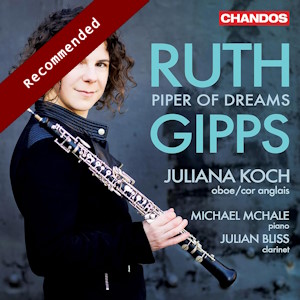
Ruth Gipps (1921-1999)
Piper of Dreams
Juliana Koch (oboe, cor anglais)
Michael McHale (piano)
Julian Bliss (clarinet)
rec. 2023, Potton Hall, Suffolk, UK
All first recordings
Chandos CHAN20290 [69]
Ruth Gipps’s music is inventive, tuneful and most enjoyable – but not yet widely known. Case in point: the works here all get their première recordings. Not only was she a woman composer but she worked during the twelve-tone fashion. She expected little of her orchestral music to get an airing, so she turned to chamber music, and we are thankful.
Six of these eight pieces are the work of a teenager, and a particularly gifted one. (She came second at the Brighton Festival, playing a short piano piece she wrote at seven, later published by Forsyth of Manchester.) She wrote four of them for her friend and fellow oboist, Marion Brough.
I am, as usual, at a loss to select adjectives that would convey my satisfaction. The early works here are as masterful and idiomatic as the late ones. The programme begins with a brilliant late sonata, chock-full of fine tunes, the last movement in particular. It is mostly upbeat, as are other works here except maybe the more pensive Threnody.
There are three short pieces in the Kensington Gardens Suite. Elfin Oak has, astonishingly, six marked sections in all of its less than two minutes. The amusingly titled Fat Pigeon conjures up a waddling bird. Chestnut Trees is satisfyingly evocative.
The Sea-weed Song is a charming folklike air. There follows the Sea-shore Suite with three short movements: Gulls, Sea Anemone, Stormy Beach. Gipps captures the sound of gulls perfectly. The other pieces also live up to their titles.
Forty-six years separate the two oboe sonatas but the first, as noted, is already quite mature. I especially enjoyed the Tempo di Bolero final movement, which brings the dance to mind very well. The title track, Piper of Dreams for oboe solo in five short sections, has a wonderfully mellifluous tune.
The Trio for oboe, clarinet and piano – for me, the most impressive work here – shows that Gipps understood how the three instruments work together for a memorable whole. The almost nine-minute first movement is a feast of beautiful tunes. The reflective second movement may express best the composer’s feelings about the ongoing world war. The mood is lifted in the Allegro ritmico, quasi rumba movement: the trio fairly dances off the page.
This lovely disc ends with the late Threnody. Gipps writes about a mourner wandering in a churchyard, who finds solace upon hearing the church choir singing Psalm 121, I will lift up mine eyes unto the hills. In this sublimely soulful piece, the cor anglais capably represents the human grief and consolation.
If you are new to Gipps’s music, this disc should delight you, and perhaps encourage you to explore her orchestral compositions. Juliana Koch is a consummate musician, a Professor of Oboe at London’s Royal College of Music and Principal Oboist in the London Symphony Orchestra. She showcases Gipps’s brilliance. Pianist Michael McHale is a sympathetic and supportive accompanist. Clarinetist Julian Bliss does very well in the Trio. I was thrilled, and I suspect that the composer would have been, too.
Steve Arloff
Buying this recording via a link below generates revenue for MWI, which helps the site remain free


Contents
Sonata No.2 Op.66 (1985) for oboe and piano (for Catherine Pluygers)
Kensington Gardens Suite Op.2 (1938) for oboe and piano (dedicated to Marion Brough)
Sea-weed Song Op.12c (1940) for cor anglais and piano
Sea-shore Suite Op.3b (1939) for oboe and piano (dedicated to Marion Brough)
Sonata No.1 Op.5a (1939) for oboe and piano (dedicated to Marion Brough)
The Piper of Dreams Op.12b (1940) for unaccompanied oboe (dedicated to Marion Brough)
Trio Op.10 (1940) for oboe, clarinet and piano
Threnody Op.74 (1990) for cor anglais and piano or organ (for Marcia Ferran)

















